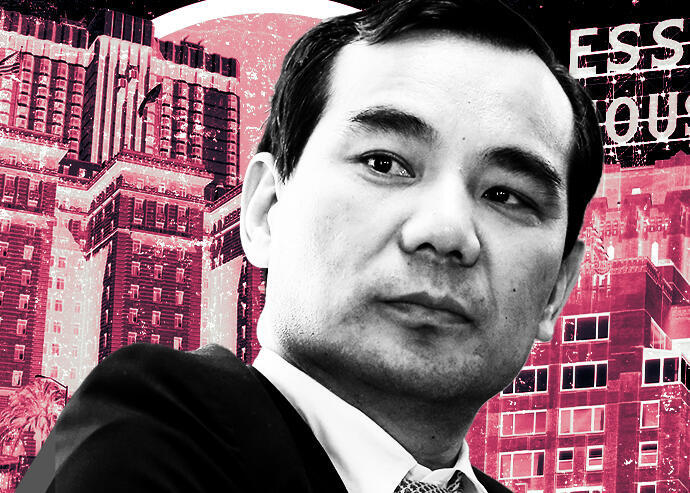
Wu Xiaohui, former chairman, Anbang, in front of Westin St. Francis (left) and JW Marriott Essex House (right) (Getty Images, Flickr user: Eric Molina – via Wikimedia Commons, MusikAnimal – via Wikimedia Commons, iStock)
After years spent trying to sell off its U.S. hotel portfolio, Dajia Insurance Group, the successor to the now-defunct China-based insurance provider Anbang, scored a lifeline on the JW Marriott Essex House in Midtown and four other properties in need of funding.
Goldman Sachs is backing an $881 million CMBS loan on the five-hotel portfolio, according to a Moody’s report, about 20 percent of which will be allocated to the Essex House, the 528-key establishment at 160 Central Park South, which Anbang acquired as part of a larger portfolio in 2016.
Moody’s provided a lower valuation of the 44-story tower than its owners’ estimation of $436 million, or a little over $825,000 per room, valuing it instead at a mere $145.2 million, or $275,000 a room — a cut of nearly $290 million.
The hotel, which relies both on business and international travel, has operated at a lower cash-flow margin — meaning it produces less cash from its sales — than some of its competitors, according to Moody’s.
The news comes the same week that Denihan Hospitality Group sold four Manhattan hotels to Massachusetts-based Sonesta International Hotels. The terms of that deal were not disclosed, but Sonesta’s $239 million acquisition loan for the portfolio, which Denihan refinanced for $320 million in 2016, suggests the properties have diminished significantly in value.
Also slashed in Dajia’s portfolio was the Westin St. Francis in San Francisco, a 1,195-key hotel that city’s Union Square, built in 1931. Dajia has valued the property $436 million, or $364,850 per room; Moody’s came in at $298.8 million, or $250,000 per key.
Anbang assumed ownership of the five hotels in 2016, when it purchased Chicago-based Strategic Hotels & Resorts from Blackstone. Two years later, Anbang’s chairman was in prison for fraud and the Chinese government seized control of the entire insurance company.
Since then, Chinese state-owned Dajia Insurance Group has held ownership of the U.S. hotel portfolio. Dajia is listed as the loan’s borrower, through 10 separate limited liability companies, according to the report.
Neither Dajia, nor Strategic Hotels & Resorts could be reached for comment.
The five properties were the last hotels in the former Anbang portfolio without a lifeline. First, Dajia tried to sell the portfolio in 2020 to South Korea’s Mirae Asset Management, but the deal fell through. In October, Goldman Sachs and Bank of America refinanced 10 other hotels formerly owned by Anbang with $2.1 billion in debt.
Dajia’s new floating-rate, interest-only loan will mature in 2024, though the firm has options to extend it for three more years. The debt will bear interest at the one-month secured overnight financing rate plus 3.53 percent — a higher rate than Blackstone’s recent refinancing of 106 Motel 6 and Studio 6 motels across the country.
With the new cash, Dajia appears to have accepted its fate and is getting in position to hang on to the properties. The state-owned company is planning to spend $140 million to renovate all five hotels.
The other hotels in the portfolio are the 653-key Continental Miami, the 222-key Four Seasons in Washington, D.C., and a 792-room Continental hotel in Chicago.



